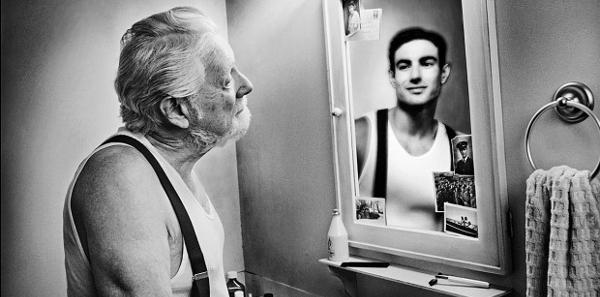
I learned something a few days ago. It came to me just after a discussion with my wife regarding her feelings about my beard.
To begin, she’s not a fan of my beard by default, at least not at the length I’ve been keeping it lately. That being said, she doesn’t completely hate it. It’s just that when it gets a little more ZZ Top-ish, she doesn’t appreciate the scragginess when I kiss her, or the fact that she has to be a spotter at dinner, being ready with a glance and gesture to let me know that not all of my spaghetti sauce made it into my mouth.
I do appreciate her help in this regard. By the way, remind me to tell you the story sometime about what happened to me at a gas station in Milford after having eaten a bag of popcorn with the kids in the lunchroom at the school.
Anyway, Jennifer knew me when I didn’t have the beard, and so she knows why I started growing it.
First of all, while my life doesn’t move along at the speed of light, at a minimum, it’s often clocking very near the speed of sound. Speaking practically, growing a beard has made getting ready in the mornings much easier. Not having to shave gives me a few minutes more. Yes, minutes matter to me. Secondly, I’ve always had a young face. And even though I’m a long way from my thirties, even with the beard, people swear I’m barely into them. That’s nice, right? Except for a guy who has a side hustle of reviewing whiskies, without the beard, it used to be that I could barely get the lady behind the counter at the liquor store asking my age to believe the driver’s license I was showing her wasn’t fake.
“That’s you, huh?” she’d ask.
“Yep,” I’d reply, “that’s me.”
“You look young for your age,” she’d continue.
“Yeah, well, I’m married, have four kids, and a mortgage,” I’d offer. “And one of those kids is in college.”
My beard has helped somewhat in this regard.
But without rambling on for too long about this, what lesson did I learn after my discussion with Jennifer? I learned that only one of the two reasons remains for keeping the beard.
Honoring my promise to Jennifer to do some trimming, I went upstairs to begin the task. As I gathered closely to the mirror, I realized I really don’t have a young face anymore. I saw wrinkles I’ve never seen before, and a tiredness that I used to only be able to feel but not necessarily observe. And while I’ve always had a thick head of hair, I noticed far more of it had begun silvering. In fact, most of the beard hair that ended up in the sink was gray. Jen says the gray makes me look distinguished. I don’t know about that. What I do know is that as I zipped this way and that way with the electric trimmers, I could hear the words “You look young for your age” beginning to carry a far different tone. What was once something that sort of bothered me had become in that moment a compliment.
But here’s the twist: A compliment like that is only given by someone who thinks you’re old. In other words, the tables had officially turned. To use youthfulness as a compliment is to admit I’m not youthful.
Maybe I’m digging too deeply here. I guess I do that with these things, sometimes. Nevertheless, Jennifer and I keep each other accountable when it comes to this whole aging thing. She’ll say to me just as I’ll say to her, “Don’t wish the days away.” Usually it’s said in a moment of frustration over the kids, or work, or something challenging. And certainly we say it mindful of the future—that eventually the day will come when there won’t be any more days like these. In that light, we say these words to remember to be immersed in the moment.
It was Seneca who said, “Old age is an incurable disease.” It’s an illness we all possess, and in a sense, doing whatever we can to look or feel as young or old at any given moment is not necessarily the issue, but rather the awareness that an endpoint is always eminently near. Death can and will arrive at the appointed time. I remember hearing the news that my grade school friend Todd had fallen from a tree and died. I remember hearing people say his death was untimely. But in truth, when it comes to Death, age doesn’t really matter. We’re all going to die.
Knowing this, as an extension of the lesson learned while trimming some of my beard away, I thanked the Lord for His grace, acknowledging He has been so very good to me and my family. I thanked Him for being fully immersed in every moment of my life—and the life of my family—especially when we as individuals weren’t as invested. I ended that prayer by holding Him to His promise to continue to be there for us until our very last hour together, knowing my greatest hope is not that we’ll never taste Death, but that Jennifer, Joshua, Madeline, Harrison, and Evelyn will one day be within my reach in the glories of eternal life in heaven.
I suppose one of the best lessons to be learned by all of this is that Christians can look into the mirror, see an aging expression, and yet be confident enough to face the setting sun of this mortal life it is betraying. Easter prompts this courage. It reminds us of a sunlight that never sets, one not being emitted from a sun or moon, but rather from God Himself (Revelation 21:23). It brings to mind the death of Death (2 Timothy 1:10) and the resurrection and restoration of failing bodies (Philippians 3:21). It reminds us that we aren’t inheritors of this life, but of the life to come (Titus 3:7). A glance in the mirror, while it will reveal the mortal illness of age, through the lens of faith, it can also show you the face of someone the Lord looked upon in love, someone the Lord went into the fray of Sin and Death to snatch back from the dreadful permanency of eternal Death awaiting each and every human being at the end of the illness. The next time you look in the mirror, I encourage you to think on this Gospel truth. And maybe even offer a prayer, as I did, thanking the Lord for the days you’ve been given, and for any of the days yet to come.

 Right now, my office is a mess. Before I left it yesterday afternoon, as I turned to close the door, I scanned the room and could see the disaster to which I’d be returning. My desk is buried beneath papers. And that’s not the half of it. I have books all over the floor, countless sticky notes hanging from this or that shelf, and a number of other things strewn throughout the entirety of the space. It’s enough to give any visitor the impression I’m about as disheveled as they get.
Right now, my office is a mess. Before I left it yesterday afternoon, as I turned to close the door, I scanned the room and could see the disaster to which I’d be returning. My desk is buried beneath papers. And that’s not the half of it. I have books all over the floor, countless sticky notes hanging from this or that shelf, and a number of other things strewn throughout the entirety of the space. It’s enough to give any visitor the impression I’m about as disheveled as they get.